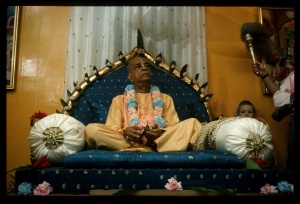SB 3.8.29

A.C. Bhaktivedanta Swami Prabhupada
TEXT 29
- parārdhya-keyūra-maṇi-praveka-
- paryasta-dordaṇḍa-sahasra-śākham
- avyakta-mūlaṁ bhuvanāṅghripendram
- ahīndra-bhogair adhivīta-valśam
SYNONYMS
parārdhya — very valuable; keyūra — ornaments; maṇi-praveka — highly valuable jewels; paryasta — disseminating; dordaṇḍa — arms; sahasra-śākham — with thousands of branches; avyakta-mūlam — self-situated; bhuvana — universal; aṅghripa — trees; indram — the Lord; ahi-indra — Anantadeva; bhogaiḥ — by hoods; adhivīta — surrounded; valśam — shoulders.
TRANSLATION
As a sandalwood tree is decorated with fragrant flowers and branches, the Lord's body was decorated with valuable jewels and pearls. He was the self-situated tree, the Lord of all others in the universe. And as a sandalwood tree is covered with many snakes, so the Lord's body was also covered by the hoods of Ananta.
PURPORT
The word avyakta-mūlam is significant here. Generally, no one can see the roots of a tree. But as far as the Lord is concerned, He is the root of Himself because there is no other separate cause of His standing but He Himself. In the Vedas it is said that the Lord is svāśrayāśraya; He is His own support, and there is no other support for Him. Therefore, avyakta means the Supreme Lord Himself and no one else.